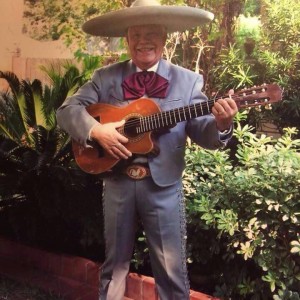A eulogy for my uncle, a mariachi

 By Ray Salazar, The White Rhino
By Ray Salazar, The White Rhino
Today, we lay my uncle Ruben H. Vázquez to rest. This is the eulogy I prepared to honor his life.
It would be unfair to let sadness dominate the memories of my uncle. My tío was a man who always smiled and who used his gift of singing to bring happiness to others.
While he was many things to many people, Rubén Vázquez was best known for being a mariachi.
A self-taught musician and singer, my tío found his self-fulfillment in music at a young age in a poor home in Michoacán. My grandfather who was also a musician discouraged him because he knew a musician’s life is hard. Still, my tío continued to sing.
Many times, he sang at the kitchen table with my grandmother and the song said: “O gran Dios, cuánto sufro en la vida por no querer yo ser menos que nadie.”
When we hear mariachi music, when the trumpets exhale and when the violins’ hum swells, when the guitar strings sweep the melody forward, that sound overwhelms us like holy water at our baptism. And like my tío the singer, we take in a deep breath.
In 1956, after coming to Chicago when he was 26 years old, my tío joined one of the first mariachis in Chicago—El Mariachi Potosino—the premiermariachi back then. This mariachi, with my tío who worked as a factory shipping clerk, played at President Nixon’s inaugural gala. They performed with Mexican superstars like Lola Beltrán. The group recorded an LP, a 45, with four songs.
No matter what, my tío made time for his music because music fulfilled him. That’s my tío’s legacy for me—to live a life of self-fulfillment and to use that to help others find joy.
We may not have the musical talents that my tío possessed, but we can use his example to find our own self-fulfillment.
My tío always had a song and he always had a joke. How wonderful is it that my cousins Ruben and Art were there to hear my tio’s last joke after his surgery.
Now, I did not inherit the good Vázquez singing voice and I am not good at telling jokes, so I won’t sing and I won’t tell one of my tío’s jokes. Even though they were corny jokes, he still made people smile—because my tíoalways smiled.
I remember one party at my tío’s Carol Stream home. I must have been ten. In the attached garage that my tío converted into a rec room, he sat on the sofa switching between a violin and a guitar. All the guests sat around him as he sang and asked, “¿Cuál quieren?” “Which one do you want?” With his generous voice, my tío found a way to give.
With his music, my tío made peace with the world even during difficult times.
In 1996, my tío laid my tía Nieves to rest, after 35 years of marriage.
In the late 80s, my tío saw his son Hector go off to college, to the University of Illinois at Urbana-Champaign. In 1998, when it was much too early, mytío saw son his laid to rest.
My tío, I’m certain, found consolation and inspiration to continue in life through his music.
About sixteen years ago, my tío began to share his life with Santa Ortiz, a woman who, I remember someone saying at their wedding, feel in love with Ruben when she saw him sing. She fell in love with a mariachi. She loved him, cherished his company, prayed with him, and celebrated his music.
Around the time my tío started dating Santa, I was a member of the Mexican Folkloric Dance Company of Chicago. And one Sunday evening at Loyola University, by chance, I got to share the stage with my tío, el mariachi. I felt proud to tell everyone, “That’s my tío!”
Linda Ronstadt, the rock singer who also became celebrated for hermariachi album, “Canciones de mi padre,” says in her memoir, “There are so many ways to leave a song behind.”
If you ever have the pleasure of spending an evening singing karaoke with my cousins—like I have—you’ll hear the songs my tío leaves behind.
You’ll hear them in Ruben’s voice because he is always the first to smile and always the first to sing.
You’ll hear them in Pat’s voice, especially if it’s a love song, because her heart overflows with love for everyone around her.
You’ll hear the songs in Mike’s voice because he cherishes Sunday evening memories when his father did not work.
You’ll hear the songs in Art’s voice because he treasures his father’s history.
You’ll hear the songs each time Albert’s voice resounds when he hits the bass notes. Those songs, I believe, lift his spirits.
It has been these karaoke get-togethers and the good times with my cousins that have served as an inspiration to my mom, my tío’s youngest sister.
All four of my tío’s sisters traveled to Texas last week to see their brother.
I believe my tío heard the voices of all the loved ones surrounding him when he took he last breath.
Once, I heard a person of faith explain what happens when we take our last breath. When we are born, God fills us with our first breath—the breath of life. And when we die, we exhale and give back that breath to our creator—it is still the breath of life.
Last week, with a singer’s strength, my tío gave up his breath of life to the goodness in the universe that created him 85 years ago.
Last week, if he could have used his voice, my tío would have told all the loved ones at his bedside a corny joke. And he would have sung.
If we cry today, we should remember what one of my aunts said last week: “Llorar es bueno.” It’s good to cry.
And we should also remember what my tío Ruben showed us: it’s good smile, good to laugh, and good to sing.
This morning, as flights of angels carry my tío’s spirit to its rest, my tío’s spirit is singing.

And we will always hear his spirit every time we hear mariachi music and think:
That’s my father’s music
That’s my abuelito‘s music
Esa es la música de Rubén.
That’s Ruben’s music.
So now, from that old 45 that my tío recorded decades ago, this is my tío Ruben singing with El Mariachi Potosino:
Since 1995, Ray has been an English teacher in the Chicago Public Schools. In 2003, Ray earned an M.A. in Writing, with distinction, from DePaul University. In 2009, he received National Board Certification. His writing aired on National Public Radio and Chicago Public Radio many times and have been published in the Chicago Tribune and CNN. For thirty years, Ray lived in Chicago’s 26th Street neighborhood. Today, he lives a little more south and a little more west in the city with his wife, son, and daughter.
[Photo courtesy of Ray Salazar]
